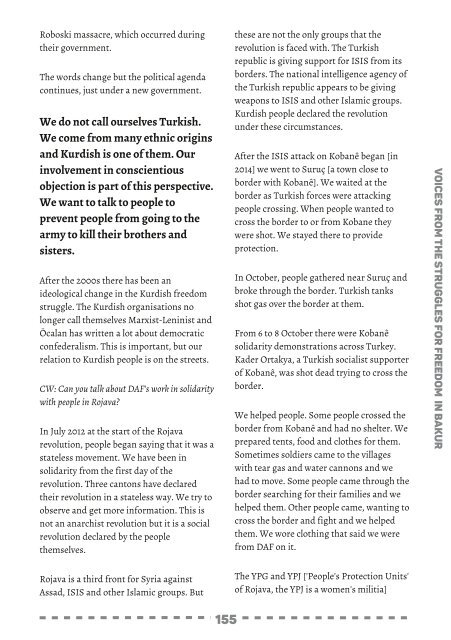STRUGGLES
Struggles-for-autonomy-in-Kurdistan
Struggles-for-autonomy-in-Kurdistan
You also want an ePaper? Increase the reach of your titles
YUMPU automatically turns print PDFs into web optimized ePapers that Google loves.
Roboski massacre, which occurred during<br />
their government.<br />
The words change but the political agenda<br />
continues, just under a new government.<br />
We do not call ourselves Turkish.<br />
We come from many ethnic origins<br />
and Kurdish is one ofthem. Our<br />
involvement in conscientious<br />
objection is part ofthis perspective.<br />
We want to talk to people to<br />
prevent people from going to the<br />
army to kill their brothers and<br />
sisters.<br />
After the 2000s there has been an<br />
ideological change in the Kurdish freedom<br />
struggle. The Kurdish organisations no<br />
longer call themselves Marxist-Leninist and<br />
Öcalan has written a lot about democratic<br />
confederalism. This is important, but our<br />
relation to Kurdish people is on the streets.<br />
CW: Can you talk about DAF's work in solidarity<br />
with people in Rojava?<br />
In July 2012 at the start ofthe Rojava<br />
revolution, people began saying that it was a<br />
stateless movement. We have been in<br />
solidarity from the first day ofthe<br />
revolution. Three cantons have declared<br />
their revolution in a stateless way. We try to<br />
observe and get more information. This is<br />
not an anarchist revolution but it is a social<br />
revolution declared by the people<br />
themselves.<br />
Rojava is a third front for Syria against<br />
Assad, ISIS and other Islamic groups. But<br />
these are not the only groups that the<br />
revolution is faced with. The Turkish<br />
republic is giving support for ISIS from its<br />
borders. The national intelligence agency of<br />
the Turkish republic appears to be giving<br />
weapons to ISIS and other Islamic groups.<br />
Kurdish people declared the revolution<br />
under these circumstances.<br />
After the ISIS attack on Kobanê began [in<br />
2014] we went to Suruç [a town close to<br />
border with Kobanê]. We waited at the<br />
border as Turkish forces were attacking<br />
people crossing. When people wanted to<br />
cross the border to or from Kobane they<br />
were shot. We stayed there to provide<br />
protection.<br />
In October, people gathered near Suruç and<br />
broke through the border. Turkish tanks<br />
shot gas over the border at them.<br />
From 6 to 8 October there were Kobanê<br />
solidarity demonstrations across Turkey.<br />
Kader Ortakya, a Turkish socialist supporter<br />
ofKobanê, was shot dead trying to cross the<br />
border.<br />
We helped people. Some people crossed the<br />
border from Kobanê and had no shelter. We<br />
prepared tents, food and clothes for them.<br />
Sometimes soldiers came to the villages<br />
with tear gas and water cannons and we<br />
had to move. Some people came through the<br />
border searching for their families and we<br />
helped them. Other people came, wanting to<br />
cross the border and fight and we helped<br />
them. We wore clothing that said we were<br />
from DAF on it.<br />
The YPG and YPJ ['People's Protection Units'<br />
ofRojava, the YPJ is a women's militia]<br />
voices from the struggles for freedom in bakur<br />
155


